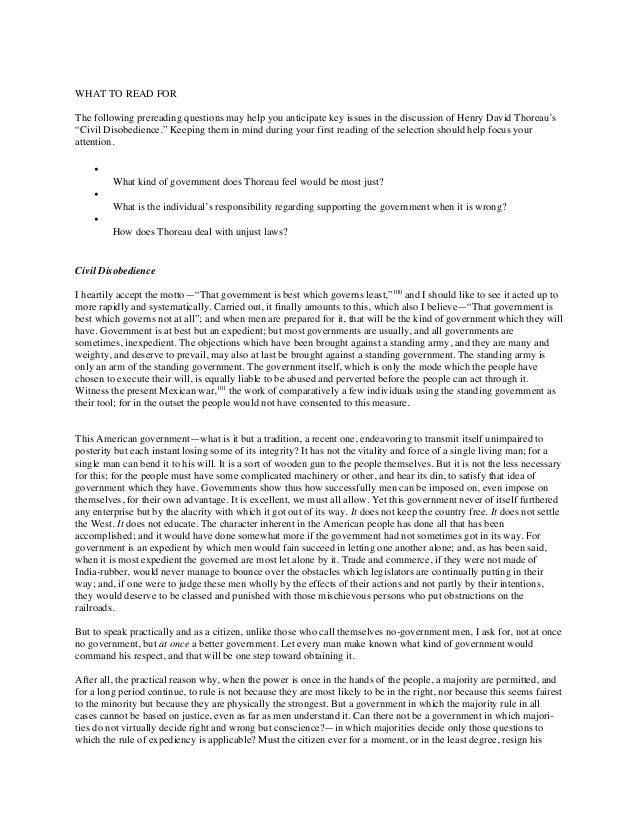Find Free Essays
· When breaking the law one should know the punishment. Civil disobedience is an act of intentionally breaking a law or refusing to cooperate with the government. If the Law is based on an unjust opinion then I think most would agree that it is okay to go against the law during his lifetime, his essay on civil disobedience was later “re-discovered” by Mohandas Gandhi, who came across it while studying law at Oxford as a young man. Gandhi later used the essay as a foundation for his efforts in India resisting the British government through civil disobedience. Through Gandhi, Thoreau’s workFile Size: KB Emerson ends his essay “Self-reliance” with the following: “Nothing can bring you peace but yourself. Nothing can bring you peace but the triumph of your own principles.” Following this, some years later, Thoreau writes “Civil Disobedience” after he is imprisoned for adhering to his own moral compass, which is at odds with the state laws

Essay examples
Civil disobedience has also been a popular and effective means of bringing about change in earlier United States history as well as much of the women’s suffrage movement and early portions of the emancipation process were based around civil disobedience (Perry, ). Practicing civil disobedience takes an immense amount of patience during his lifetime, his essay on civil disobedience was later “re-discovered” by Mohandas Gandhi, who came across it while studying law at Oxford as a young man. Gandhi later used the essay as a foundation for his efforts in India resisting the British government through civil disobedience. Through Gandhi, Thoreau’s workFile Size: KB In his Essay, “Civil Disobedience”, Henry David Thoreau argues that society functions the most efficiently when it is not ruled by an overpowering monarch, or by a strong central government, but by the people, essentially having self-reliant peoples that do not necessarily need a government, Civil Disobedience Book Report Literature Review
Top 10 Similar Topics
Civil disobedience has also been a popular and effective means of bringing about change in earlier United States history as well as much of the women’s suffrage movement and early portions of the emancipation process were based around civil disobedience (Perry, ). Practicing civil disobedience takes an immense amount of patience · When breaking the law one should know the punishment. Civil disobedience is an act of intentionally breaking a law or refusing to cooperate with the government. If the Law is based on an unjust opinion then I think most would agree that it is okay to go against the law Civil Disobedience is known as breaking the law because you don 't agree with a certain law or have a peaceful protest about that law or what you believe in. An example would be when Mahatma Gandhi walked miles to the Indian ocean as the citizens gathered more and more to fight for there Indian Independence. This occasion was called the Salt March

Recent Posts
during his lifetime, his essay on civil disobedience was later “re-discovered” by Mohandas Gandhi, who came across it while studying law at Oxford as a young man. Gandhi later used the essay as a foundation for his efforts in India resisting the British government through civil disobedience. Through Gandhi, Thoreau’s workFile Size: KB · Civil Disobedience is a method that the United States uses to correct the issues that would exist such as racial inequality, unbalanced business organization, immoral values, and et cetera. This method is a peaceful value since it requires no violence and revolution. This is a positive way of correcting any free society on this Earth Civil disobedience is an act of refusal by a large group of people against certain laws. From Ghandi to Martin Luther King Jr, people have used civil disobedience to enact change. While the concept of civil disobedience has been around for centuries, it hasn’t been called civil disobedience until recently

Essay Examples
· When breaking the law one should know the punishment. Civil disobedience is an act of intentionally breaking a law or refusing to cooperate with the government. If the Law is based on an unjust opinion then I think most would agree that it is okay to go against the law during his lifetime, his essay on civil disobedience was later “re-discovered” by Mohandas Gandhi, who came across it while studying law at Oxford as a young man. Gandhi later used the essay as a foundation for his efforts in India resisting the British government through civil disobedience. Through Gandhi, Thoreau’s workFile Size: KB Civil disobedience is an act of refusal by a large group of people against certain laws. From Ghandi to Martin Luther King Jr, people have used civil disobedience to enact change. While the concept of civil disobedience has been around for centuries, it hasn’t been called civil disobedience until recently
No comments:
Post a Comment